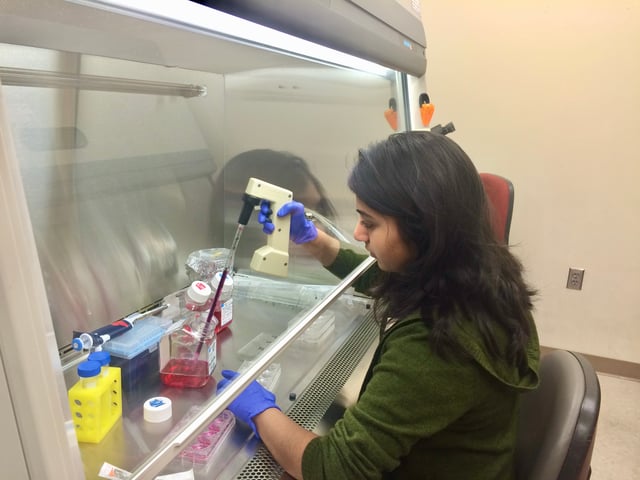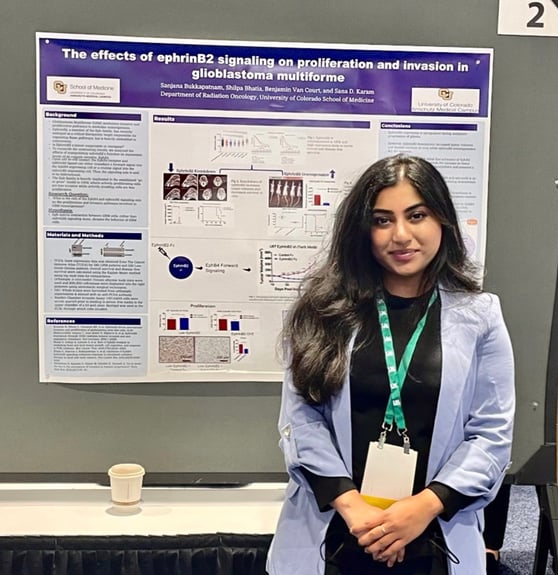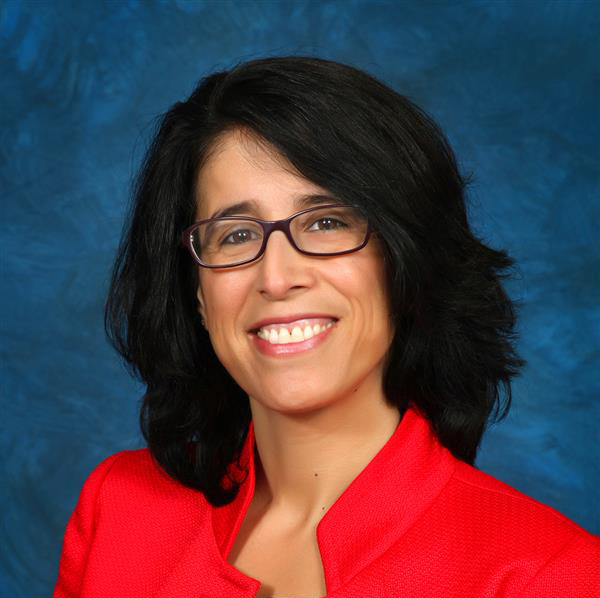Sanjana Bukkapatnam, a fourth-year medical student at the University of Colorado School of Medicine, scored a victory in April when her paper on her glioblastoma research took first place in the National Poster Competition at the American College of Physicians Conference in Chicago.
For Bukkapatnam, the win was the culmination of six years of research that began when she was an undergraduate at CU Denver. While taking part in the CU Cancer Center’s summer fellowship program for undergraduates, she first started working with her mentor, Sana Karam, MD, PhD, a CU Cancer Center member and associate professor of radiation oncology. It’s a relationship that continued to grow over the next six years.
“I frequently refer to her as my second mother, because she really took me under her wing when I joined her lab,” Bukkapatnam says. “I was just this undergrad who had really big dreams, but didn't know where to go. She challenged me in ways that I needed to be challenged, and in ways that promoted my own self-growth.”
Studying eph-ephrins
Working in Karam’s radiation oncology lab, Bukkapatnam began to study a receptor tyrosine kinase family called eph-ephrins that are involved in numerous malignancies. She became particularly interested in the role of the ligand ephrinB2 in glioblastoma — one prominent study demonstrated that it was a tumor suppressor, while another showed that it was an oncogene.

Bukkapatnam working in the lab.
“Based on our knowledge of the way this ligand acts in other cancer models, we decided to look at the way it interacts with its cognate receptor, ephB4, and look at whether this interaction plays a role in the tumorigenesis of glioblastoma,” Bukkapatnam says. “Interestingly, ephrinB2 and ephB4 signaling is bidirectional, and depending on the direction of signaling elicited, there are different downstream effects.”
Karam and Bukkapatnam worked together on research that eventually showed how ephrinB2 works with its receptor ephB4 to mediate downstream effects on invasion and proliferation in glioblastoma. Depending on the direction of eph-ephrin signaling initiated, invasion/proliferation was either promoted or inhibited.
“This study was critical in our understanding of the role of this family in glioblastoma, as it not only shows that ephrinB2 does not act alone, but it also shows that manipulation of the ephB4-ephrinB2 signaling axis may have implications on future drug design,” Bukkapatnam says. “Drugs that manipulate this axis to both inhibit invasion and proliferation can yield optimal therapeutic outcomes for patients suffering from deadly tumors.”
It was this research that won Bukkapatnam first prize in the poster contest. The recognition comes as no surprise to Karam, who praises her mentee’s work ethic and strong interest in research.
“It's also a matter of the persistence that she showed, coming in during winter break, during any school break, holidays, weekends,” Karam says. “She did a lot of the research as an undergrad for credit and nonpaid. She has such an incredible dedication to research. This young woman is going to go places; she’s going to go on to move needles for our patients.”
Mentorship is the key to success
For Bukkapatnam, who has been interested in a career in medicine since she had a surgery at 8 years old and realized that “doctors are the people who take the pain away,” finding a mentor like Karam was key to the success she’s had so far. She was accepted to the CU School of Medicine right after finishing her undergraduate degree, and starting in her first year she was able to continue the research she had started in Karam’s lab.

Bukkapatnam with her winning poster at the American College of Physicians Conference in April.
“She introduced me to the world of cancer biology and how to be a physician and do research simultaneously to provide the best outcomes for your patients,” Bukkapatnam says. “In medical school, as I was working with different oncologists during my rotations, it really solidified that this was where I needed to be and this is the field that I wanted to pursue.”
Residency and beyond
After graduating from the CU School of Medicine this week, Bukkapatnam will be off to the University of Texas Health Science Center at Tyler for an internal medicine residency, followed by a three-year oncology fellowship. After that, she hopes to have a career like that of Karam, whom she describes as “a perfect example of the kind of physician I want to be.”
“I definitely want to practice clinical oncology — I absolutely adore the patients,” Bukkapatnam says. “I want a very strong clinical practice, but I also want to be involved in conducting cancer research as well. For me, it’s like two arms of the same thing. I couldn’t just do the clinical aspect, and I couldn't just do the research — I would want to do them together in order to provide the best care for my future patients. Sana has really shown me how you can do that in a very synergistic, beautiful, and seamless manner.”




